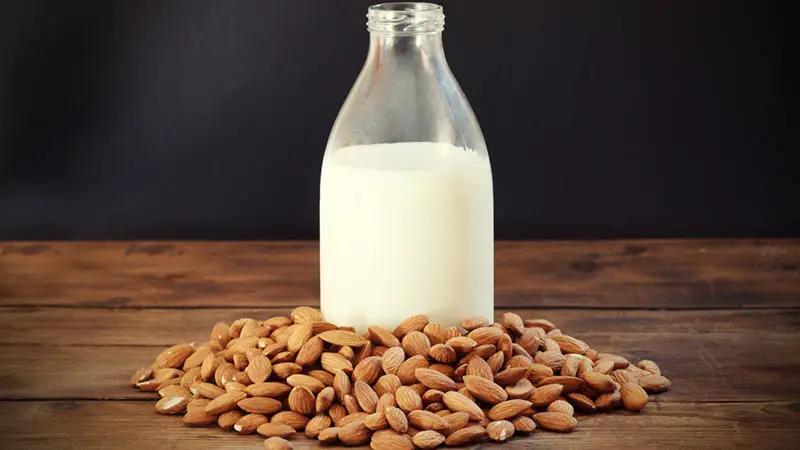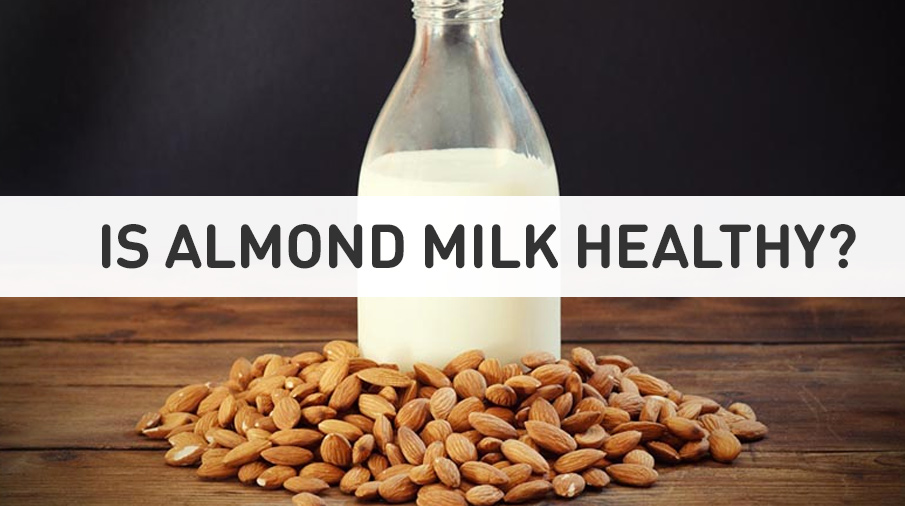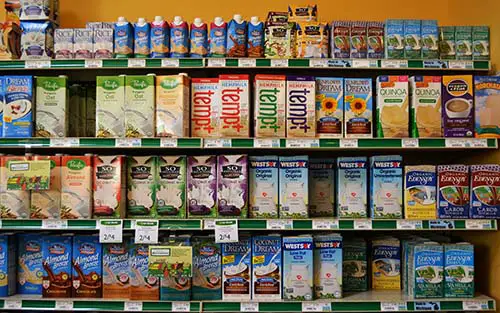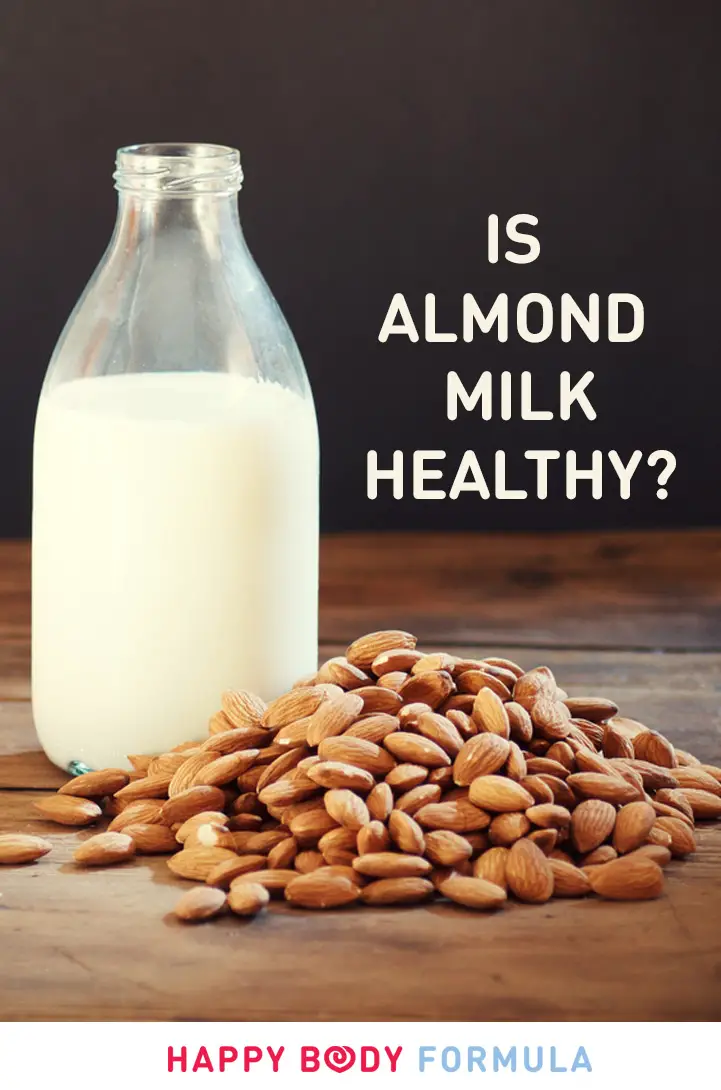Medically review by Kim Langdon

Well, we knew it was coming.
It is time to answer the age-old question: Is almond milk healthy?
Okay, maybe it's not an age-old question just yet, but it's certainly one that we've been asking over the past year as almond milk sales skyrocket and become a common grocery staple in our refrigerators.
Gone are the gallons of skim milk (which is undoubtedly a good thing) and in are the days of nut milk.
Off the bat, almond milk is a great discovery for those who cannot tolerate dairy or choose not to consume soy.
It gives the lactose-intolerant folks some choices they wouldn't have otherwise, and in this sense, almond milk is great! It's convenient, inexpensive and easy to find at most grocers due to its growing popularity.
There's plenty of good news about almond milk, but there are a few downsides to consider - aren't there always?
Let's talk about it.
Breaking down the almond milk nutrition
Considering almond milk is made of almonds, it inherently contains some of the benefits of the nut itself. Almonds are pretty good for you.
They contain 6 grams of protein per ounce which is superior compared to most nuts.
They also contain substantial amounts of magnesium and fiber amongst a plethora of other vitamins and minerals.
Remember, this is the whole food we're talking about, not the milk. So, how does its liquid counterpart stack up?

Almond milk is lower in calories
While this might seem like a good thing, it's indicative of the major problem with almond milk.
It's both lower in calories than dairy milk and almonds themselves, which inevitably means it's lacking some of the nutrients that both these products contain a wide variety of.
It's low in protein
This might seem strange considering almonds are one of the most protein-heavy nuts out there.
Dairy milk is also a substantial source of protein.
So, what gives?
Turns out, almond milk is mostly water, so the actual almond content is quite low in any given container of almond milk.
We'll get more into the variety of nutrition you can get amongst different brands versus homemade later.
Potential for more additives in almond milk

Since almond milk is essentially stripped of nutrients during the process of making it, manufacturers often add in a little extra something.
While fortified foods aren't necessarily 'evil,' it's important to read your labels.
The bulk of additives to avoid is limited to added sugar, carrageenan and gums which help keep it from separating. These can be tolerated by some, so make the best choice you can.
Otherwise, you might just get a few extra vitamins and minerals which does no harm but should not replace a real food source of the same components.
Omega-6's vs. omega-3's
Omega-6 fatty acids are pro-inflammatory which aren't so great for the body.
While you can't avoid them entirely, you can prevent your intake from causing issues by balancing them with proper omega-3 fatty acid intake.
Many nuts contain high amounts of omega-6 fatty acids, almonds being one of them.
Almonds actually contain zero omega-3 fatty acids, so the consumption of almonds should be limited or eaten in a diet that includes them in abundance from other sources.
Almonds & phytic acid
Almonds contain a lot of phytic acids.
Phytates found in food bind minerals from that food thus significantly decreases their absorption rates, essentially making them useless.
Over time, a diet high in phytic acid can cause deficiencies.
When purchasing store-bought almond milk, you don't know how the almonds were prepared.
Chances are, they were not pre-soaked, which decreases phytic acid content enough to make it non-problematic.
The obvious solution is to buy from local companies who state this on their labels or make almond milk at home.
There's some good news...

While almond milk isn't the most nutritious product in the world, it's certainly not doing much harm.
Considering how little almond makes it into the standard glass of almond milk, you won't be throwing your omega-3 to omega-6 ratios out of whack with a non-dairy latte.
You also won't be taking in dangerous amounts of phytic acid. In addition to a healthy, balanced, whole-foods diet, almond milk is a good choice.
Here's some of the good news.
Blood sugar management
An unsweetened almond milk beverage won't negatively impact blood sugar due to its low carb content.
Dairy milk contains natural sugars, so it might not be the most suitable option for someone who is attempting to manage diabetes or blood sugar crashes in general.
Almonds for weight loss
Due to its low-calorie count and lack of carbs, it's a good choice for someone who's looking to drop a few pounds.
While full-fat milk contains loads of benefits from healthy fats and calcium to name a few, it can be very caloric and less conducive to weight loss in general.
Vitamin E
Almonds contain large amounts of vitamin E which can keep your complexion looking healthy and glowing.
In fact, it's one of the ten most essential nutrients for healthy skin.
You won't get all of the nutrients found in the whole nuts, but you will get some, so this benefit still stands with almond milk.
Heart healthy
While we're a bit past the fact that dietary cholesterol causes poor cholesterol overall (hint: it doesn't!), almond milk contains none of the stuff, so you don't have to worry.
It can also help to manage or reduce blood pressure making it suitable for those looking to decrease their numbers.
The major takeaway?
Purchasing or making almond milk in order to receive the health benefits of almonds themselves is futile.
Almond milk is a fantastic substitute to dairy or soy if you're missing out on milk, but it provides next to no major health benefits, when compared to whole almonds.
If we're talking about real, whole foods from natural sources, store-bought almond milk doesn't quite make the cut.
Think of it like you would the issue between something like souping and juicing for example; soups contain whole foods in their natural state while juices contain whole foods that are stripped of some essential properties, namely fiber.
This is a pretty comparable analogy when it comes to almonds vs. almond milk.
Making homemade almond milk can help boost nutrition big time. The average store-bought container of almond milk contains just a handful of almonds, aka just a handful of nutrients.
When you stack this up against the money you're spending, it seems wasteful.
Making it at home means you will be able to prepare the almonds properly prior to milking them, and squeeze out a little more goodness.
And what do you do with all that leftover nut pulp?
Try making a nut-based hummus, just like this Paleo Israeli Hummus from Greens Of The Stone Age, made with cashew nut pulp.
What do you think? Do you use almond milk, or do you have another non-dairy preference? If you make your own at home, share your tips with us below!
This article was fact checked for accuracy by Dr. Kim Langdon, MD. As always, this is not personal medical advice and we recommend that you talk with your doctor.
Share on Pinterest

References
Kimberly Langdon M.D. is a retired University-trained obstetrician/gynecologist with 19-years of clinical experience. She delivered over 2000 babies to mothers in a suburban Midwestern community.


My choice of nut milk would definately be cashew milk. Don’t really like the cashew nut but i prefer cashew nut milk over all. All I do is soak raw cashew nuts to equal part water overnight in my nutri bullet cup, then in the morning blitz. easy as that.
I adore cashew milk, and I find it easier to make at home since the nuts are creamier, easier to blend, make a tastier milk AND contain much less phytic acid.